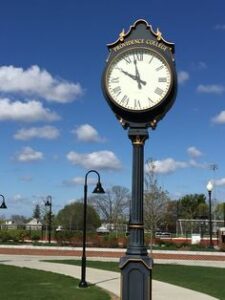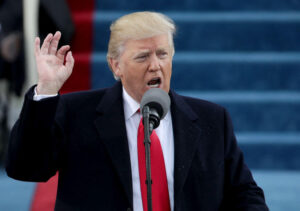Tag: Sarah Kelley ’18
Tangents and Tirades
by thecowl.opinion on May 4, 2017
Opinion

When Will Trump Learn?
This week Trump has taken another hit at women’s rights and efforts to alleviate global gender inequality. The administration has decided to discontinue “Let Girls Learn,” a signature girls’ initiative and educational program that has been especially championed since 2015 by former first lady, Michelle Obama.
This inter-governmental initiative run through the Peace Corps and the United States Agency for International Development was a testament to the importance of bipartisan multi-sectoral efforts in empowering marginalized women to reach their full potential through educational opportunities. Now it is just another reminder of the lack of support Trump continues to demonstrate towards women’s rights.
When will our president realize the importance of equality within our nation and throughout the world? Even within just his first 100 days, his lack of support for this initiative represents just one of the many instances where he has failed to support gender equality and women’s empowerment (from his global gag rule, legislation on federal funding toward Planned Parenthood, etc.)
And while his senior advisor and daughter, Ivanka Trump, has vocalized her intentions of prioritizing women and girls’ issues, the nation is still waiting to hear of any proposals she has to offer. How much longer can we stand to see this administration chip away at national and global efforts to promote equality? Only time will tell just how far the Trump Administration will let women’s rights fall by the wayside….
-Sarah Kelley ’18
Finals: An Unnecessary Evil
Why take finals? Most professors structure their classes to give two to three exams a semester. In addition, students are given consistent homework, projects, readings, and papers. In the course of one semester, students have numerous assignments are subject to be graded and said assignments are substantial enough to demonstrate that students’ knowledge of the subject.
Cumulative finals at the end of the semester are repetitive and stress-inducing. If a student does well throughout the course of the semester, then to assign a final exam worth a significant percentage of one’s grade is equivalent to setting students up for failure.
There is no sleeping during finals week, there is only studying and that in itself is detrimental to our grades. Many college students resort to taking different forms of drugs to stay up to study; others do not believe that it is physically possible to study the amount required and end up giving up on themselves.
If I have a good grade in a class, if I have done my fair share of work and have been a good student, then a final is nothing more than another opportunity to potentially bring my grade down in a class. It’s even more intense when more than one exam is on the same day.
Finals should be optional; they should be an opportunity for those who want to bring their grades up to do so. Those content with what they possess should not have to endure that week of stress, anxiety, and sleeplessness. One of the biggest issues on college campuses is that students are overwhelmingly anxious, and finals week only exacerbates a college student’s anxiety.
-Laura Arango ’20
Justice For Unpaid Interns
What is our time worth?
As the school year comes to a close, Providence College students scramble to finalize their plans for the summer. Some are returning to old summer jobs, a few students are traveling, and a large percentage of students are entering into the “world of interning.”
The internships that catch my eye are contrary to what one would think. You see, they are not the ones with the intriguing titles and detailed descriptions. Nor are they the ones that require the most work, such as research, portfolios, and final summer projects. They are the ones that pay.
Unpaid internships are a concept that I find slightly demeaning and unfair. College students can barely afford meals at the end of a semester, but we expect them to commit to an unpaid internship for the entire semester so that hopefully the experience makes them a prime candidate for the job.
In an unpaid internship a student is almost always doing exactly what a paid interns does. However, the company that decides the internship is unpaid, is making a claim that the work the student is doing is not even worthy of minimum wage. Students should feel respected for doing what they can to get their foot in the door of the working world, not discouraged.
Unpaid internships tell the student that the time he or she gives up in order to be in that learning environment, is worth nothing.
Unpaid is unfair. We may be students, but our time is worth something, not nothing.
-Kelsey Dass ’18
A Marathon Against Misogyny
by thecowl.opinion on April 27, 2017
Opinion

by Sarah Kelley ’18
Opinion Staff
On a rainy day in April 1967, 20-year-old Kathrine Switzer became the first woman to ever officially run the Boston Marathon. Having registered under the gender neutral name K.V.—the same name she used to sign all of her college assignments—Switzer knew that this was a race women were not allowed to run.
But Switzer ran it anyway. Even after being attacked by the race director, John Semple, two miles into the course, she persevered. Despite his attempts to stop her, Switzer crossed the finish line in four hours and 20 minutes. But on that day, wearing the now widely-recognized bib number 261, Switzer achieved much more than a respectable marathon time.
With every step she took from Hopkinton to Boston, Switzer proved to everyone that a woman could go the distance in the male-dominated tradition. She broke the commonly held stereotypes of her time regarding female athletic abilities. And with every stride, she empowered women throughout the world to achieve their potential in all areas of life, from running and beyond.
Fifty years later, 70-year-old Switzer again competed in this year’s Boston Marathon, celebrating the anniversary of that symbolic and powerful race. And even though half a century has passed since that fateful run, and many major achievements in the women’s rights movement have been accomplished since then, Switzer’s message of equality and women’s rights still is just as pressing and important as it was in 1967, especially in light of our current national political environment.
Despite the major advancements, the Women’s Rights Movement has achieved since the time of Switzer’s race—from the running world to our own national political arena and beyond—Switzer’s return to the Boston Marathon reminds us that we must continue running for women’s rights and equality, despite any obstacles we might face.
Countless photos of Switzer’s violent interaction with Semple from 1967 have resurfaced on various media outlets in light of her most recent run. Because of this, I could not help but be reminded of the current political obstacles women in the U.S. and around the world are now facing more than ever, in relation to the recent executive actions taken by Donald Trump in the first months of his presidency.
While women may no longer be hit on course for running a marathon today, the political hits they have taken from Trump’s presidential actions seem just as severe. From his “global gag rule” policy barring federal funding or foreign aid to any international relief agencies that perform abortion or provide information regarding abortions, to his most recent attack on women’s rights in signing recent legislation nullifying a rule which originally prohibited state and local governments from holding back federal funds for family planning services—Trump has made clear his attack on equality.
The list of misogynistic comments, sexist remarks, and appalling behaviors the president has demonstrated throughout his lifetime seem to only further parallel the same misogyny which Semple exhibited in his attempts to stop Switzer from running 50 years ago.
Yet despite what may feel like a hopeless political and social situation to some, Switzer’s return to the Boston Marathon should leave us feeling more motivated and inspired than before.
Switzer’s running is a strong and symbolic reminder of the current need to keep running towards women’s rights. Her races reflect not only how far women have come, but also how far we have to go. Switzer is a positive reminder across the country, throughout the world today, and especially in light of the changes our country is currently facing, that the run for equality continues.
Tangents and Tirades
by The Cowl Editor on April 6, 2017
Opinion

Going Nuts for PVDonuts
Although I am not a paid sponsor for any bakeries or doughnut shops, I would be doing a great disservice to Providence College and greater Rhode Island community if I did not bring to light the magic that is currently happening at 79 Ives Street, Wednesdays through Fridays, during the hours of 8 a.m.-3 p.m. at one incredible artisanal doughnut shop.
PVDonuts, Providence’s first specialty doughnut shop, is not only drawing attention from their local customers for their amazing doughnut creations, but has also gained widespread recognition from media outlets such as The Boston Globe, Buzzfeed, Daily Mail, Cosmopolitan, and Spoon University. If you have not tried their amazing doughnut creations yet, you are missing out on an amazing culinary experience unlike any doughnuts you have ever tried before.
With locally sourced ingredients, PVDonuts hand makes a wide variety of brioche yeasted donuts, traditional old-fashioned, and even vegan style doughnuts. PVDonuts is a true game changer for anyone looking for a sweet addition to their morning coffee. Their menu changes every month, so customers can expect a wide variety of imaginative flavors. From their ’90s-themed menu of March, including the “Dunkaroo” and “Oatmeal Cream Pie Donut” to their current April menu which includes, “The Elvis” and “Brown Butter Coffee Milk,” PVDonuts has established a sound reputation as a leader of the artisanal doughnut world that everyone should try.
-Sarah Kelley ’18
Lift the Laptop Ban
As we enter April, my notebook and folders are in tatters. Weeks of stuffing them into my packed backpack has shredded my notebook, and my folder is bursting at the seems with useless papers. Sifting through the mess is a nightmare, as important papers are impossible to find. Yet all of this could have been easily avoided! Everything I need could be in one convenient place: my laptop!
For someone as disorganized as myself, my laptop is essential. Everything can be neatly organized in virtual folders, and nothing can be forgotten or lost. Most importantly, I can write legible notes fast without worrying about my awful handwriting.
Yet every semester, a well-meaning professor bans laptops in their class. “Studies show on average they are not good for students,” they say, or “I think they’re distractions.” As noble as their intentions are, they are forgetting that people learn differently.
Everyone is different—it is impossible for studies to show what is good for everyone. Perhaps some find laptops distracting, but they are vital for others who are disorganized or have bad handwriting. Even if someone is irresponsible and spends class zoning out on ESPN, the rest of the class should not suffer for their mistakes. They should suffer the consequences, not others who are missing out on a crucial tool.
-Nicholas Moran ’19
Bring Back the Trees
One of the many great features of the Providence College campus is its vast stretches of greenery, but it is safe to say that the sudden lack of trees is probably not the vision most have in mind. The newfound stumps, particularly the one on Slavin Lawn, ,came as a surprise to many students. Not only has this abrupt change had a negative impact on the aesthetic of the campus, but more importantly on the environment.
When the weather is favorable, it is not uncommon to see students sitting under the shade of the trees, and it is easy to see why. On warm spring days trees are the perfect place to settle down and get homework done. The tree on Slavin Lawn was an especially popular spot for relaxing.
But these trees are more than just a means for students. Every tree that is cut down contributes to the increase in greenhouse gases reaching the atmosphere, leading to air pollution. Additionally, without trees, the soil becomes dry, losing its uniformity and its ability to produce food.
If not carefully done, replanting trees can also be harmful. Leftover sawdust can distort the ratio of carbon and nitrogen, and nitrogen is needed in order for a new tree to grow.
While there may not be an extensive diversity of species, trees are essential to the cultivation and protection of the environment of the campus.
– Hannah Paxton ’19
Clear Skies, Cloudy Future
by The Cowl Editor on March 2, 2017
Opinion

by Sarah Kelley ’18
Opinion Staff
This past week’s unusually warm weather brought a dramatic change from the frigid forecast of snow and ice that New Englanders are normally accustomed to this time of year. With temperatures holding near 70 degrees and barely a cloud in the sky, Providence College students and faculty alike have been enjoying this surprising meteorological pattern.
From Slavin to the Smith quad, fellow Friars have been taking full advantage of the unseasonable sunshine. Whether utilizing outdoor classroom spaces or playing pick-up Frisbee games, this warm weather has definitely lifted the spirits of everyone ready to be done with winter. But should we be so ready to celebrate this surprising weather?
While the benefits of warm weather in February make us want to rejoice in the early arrival of spring, we should first stop to question: what are the real climatological impacts of this weather, and should we really be happy about them?
Meteorological reports reveal over 4,400 record highs this month as February continues to challenge all historic weather patterns. And during what should be the final month of winter, mother nature has responded in confusion—with trees blossoming and producing leaves much earlier than usual in such areas as far north as Washington, D.C.
While perhaps not everyone may be interested in an early blossom, they should be more keen to take note of the potential severe rain storms across the U.S. that the early arrival of spring could carry. The Storm Center reported an “enhanced risk of severe thunderstorms” across the Great Lakes.
Even throughout the Midwest and Ohio valley—regions where severe storms are not typical until late spring—this month’s unusually high temperatures are causing meteorologists to recognize the potential of extreme weather and possible storms.
Also snow and ice coverage have been hit by the high temperature of what some are calling Februmarch. The Midwest has seen 0 percent snow cover and only seven percent of the Great Lakes featuring ice, when the typical statistics usually stands at 40 percent. Some meteorologists predict record high temperature records to be set this Friday—stretching from Florida to Michigan.
These weather patterns are not normal and have a potentially direct and severe impact on our environment as well as our safety. Climate changes should not be taken lightly, despite our instincts to welcome the warm weather. And this unseasonable weather takes on even greater significance within the context of President Trump’s recent actions, with his planning to derail Obama’s policies on climate protection and water pollution
Although it cannot be denied that this beautiful weather has lifted the spirits of many people across the U.S., recognizing the not-so-bright-and-sunny effects of climate change on our environment is crucial in raising awareness of the impact of these weather changes and in building on our own sustainability efforts throughout campus and across the nation.
Bookstore Blues
by The Cowl Editor on February 2, 2017
Opinion

Photo courtesy of the odysseyonline.comby Sarah Kelley ’18
Opinion Staff
As the Friars enter their third week of classes, syllabus week seems like a distant memory. The workload is starting to build up and many students find themselves tackling the semester’s assignments, from long readings to problem sets and everything in between. Yet the most obvious necessity for any student here at Providence College—and arguably one of the most important resources for any major or class—seems to be more difficult to attain than in past semesters on campus: books.
From my own personal experience, I waited over two weeks until I finally received a confirmation email from the bookstore to collect my missing textbooks. I visited the bookstore multiple times within the first two weeks of classes, asking multiple staff members if there was any way to see if the books had been shipped, were being processed, or were in the bookstore. I was answered in the negative to all of the above questions and no one could provide any estimate of when the books would arrive. And while I continued to receive emails reminding me my books were still on back order, there were no other forms of communication regarding any updates of the textbooks.
I first wondered if I simply had bad luck this semester, but after talking to other students, the lack of communication and timeliness of the PC bookstore seems to be more widespread than before. Many students this semester have been unable to get their textbooks from the PC bookstore in a timely manner. Many books are on backorder, some were not ordered in advance for many classes, and others seem to fall somewhere in between—in the process of being “processed” yet still not available. Some students (myself included) have even discovered that the majority of their order was already available at the store, but still did not receive an email confirmation to get those available books because some part of their order was still on backorder.
Countless students have been left in an academic limbo, waiting for a confirmation email from the bookstore, with workloads and reading assignments piling up and no sense of when their books will be arriving. Brian Cain ’18 commented on his experience with the bookstore this semester, stating, “…I ordered my books a few days before coming back to school, so it’s expected that the order wasn’t ready. But after the first week of classes, I realized I could go in and just collect my books myself and they had all but one of the books I ordered anyway. I don’t know how my order wasn’t ready if the majority of the books were there.”
Maggie Branham ’18 also commented on her troubles with the bookstore this semester, explaining, “I ended up just having to order some of my books from Amazon this semester because the bookstore did not have them ready. In one of my classes my professor is handing out photo copies because neither the bookstore nor the library has the books available.” After countless trips to the PC bookstore in the last few weeks, it seems as though there are a number of factors beyond the bookstore’s control contributing to the difficulties many students are facing in getting their book this semester.
Last week’s lines for the bookstore were out the door, and bookstore workers have seemed overwhelmed and understaffed while helping students locate their orders and find books. While some may say the bookstore needs to step up its game to meet the needs of students, the predicament many faced this semester in getting their books should not be solely attributed to the bookstore itself. Cain also commented, “Honestly I feel bad for them because they are seriously understaffed and at the liberty of the book distributors and mail service…to the claim that they [the bookstore] should just order as many books as there are students in each class, that’s not as simple as it sounds because books are so expensive (even for the bookstore) that if they over order and can’t sell the books this semester, they become useless next year and a huge loss for the bookstore.”
While perhaps the store cannot be entirely at fault for many students’ backordered books this semester, many students are still left without their main texts, wondering when they will come, with little to no information to keep themselves updated.
A Poor Delivery
by The Cowl Editor on January 26, 2017
Opinion

by Sarah Kelley ’18
Opinion Staff
Before watching President Donald J. Trump take the podium for his inaugural address, I had questions, but I also had hope. I wondered how Trump would decide to move forward as the 45th President of the United States. I wondered how he would present his plan to all of those watching—both citizens and politicians. And I wondered how he would calm the distress, fears, and emotions of many concerned Democrats and Republicans alike.
I was hopeful that, as a now inaugurated president, he might change his tactics—perhaps softening some of the populist messages that he rallied so many supporters around throughout his campaign—to reach all Americans, whether they had voted for him, or not. I was hopeful that he might take a more conciliatory tone during his address, to recognize all of those who were uneasy, fearful, or even angry about the future of our nation.
And finally, I had the highest hopes that President Trump might even allude to how he was planning to work with our government, and specifically Congress, moving forward, during a time in our nation when the political divisions are so acute, not only between Republicans and Democrats but also amongst his very own party members.
And while I and many other citizens alike wanted these questions answered and these hopes realized, for many citizens, myself included, Trump’s inaugural address fell short of truly relieving any of our apprehensions or emotions and failed to provide concrete answers to many of our questions.
In describing the transfer of power that the inauguration represented, Trump defined it as not the transfer of power from one administration to another, nor as the transfer of power from one party to another, but as the transfer of power from Washington to the people. And while this may sound nice to some, for many others the deep implications of this statement lead one to only question—what, if any, plans does Trump have to actually work with our government to move our country forward?
While our political system is far from perfect, I could not wrap my mind around how our own newly elected president could be jabbing at politicians and Washington when in fact those are the very people with which he is going to have to work. If our president were truly interested in the possibility of accomplishing anything positive during his presidency, one would think that even a slightly different approach to addressing Washington would have greatly improved the message and reception of his address.
And although this dig at Washington would not leave my mind for days to come, the many other statements Trump made throughout his address seemed to leave even more questions unanswered and widened the already present political divisions of our country.
Between Trump’s wide-sweeping promises to eradicate radical Islamic terrorism from the Earth, and his statements declaring us “protected” and “always be protected,” his suggestion to the nation that, “There should be no fear” was extremely hard to swallow.
The more words that fell from our president’s mouth, the more I was filled with apprehension of what is to come, the more I recognized that my initial questions had been left unanswered, and the more I lamentably understood that my own hopes, and the countless hopes, fears, doubts, and feelings of many other citizens around the nation would not be relieved nor lessened by this particular speech.
